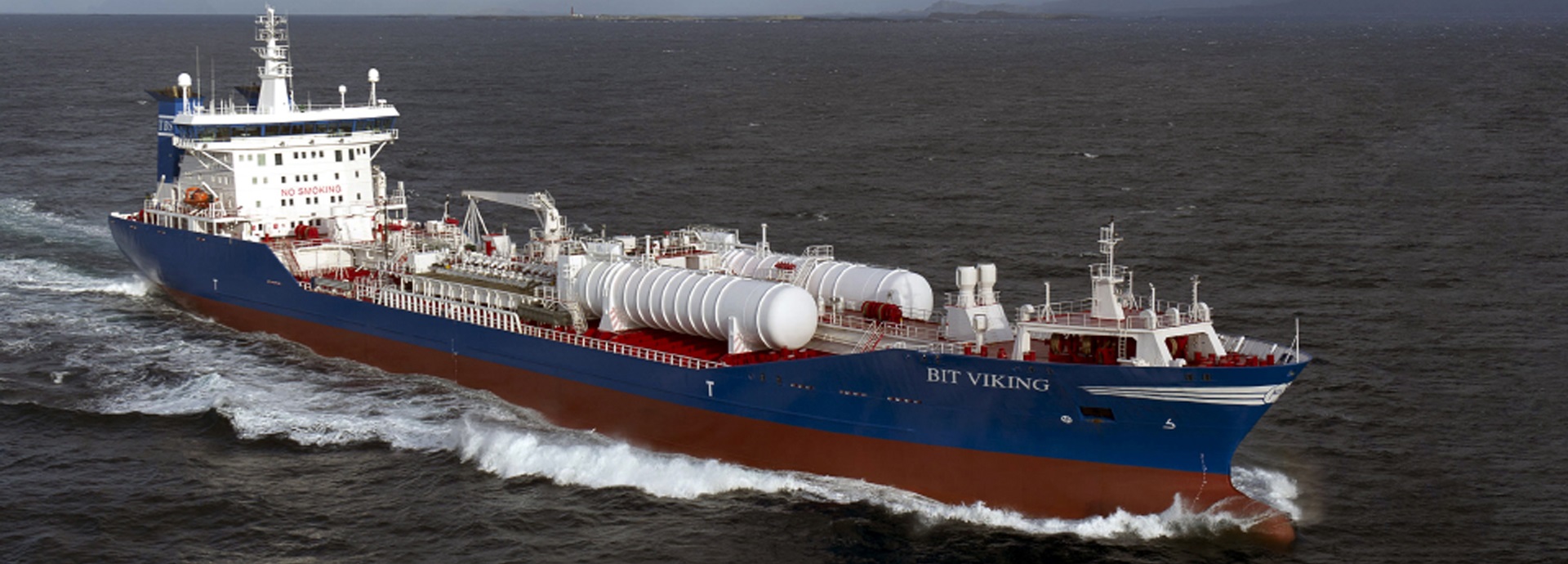

Tanker ship Bit Viking LNG conversion for environmental sustainability
Tarbit Shipping is a Sweden-based company that has been transporting bitumen, petroleum products and chemicals since 1962. The company currently operates three ships under the Swedish flag and another 10 under the Dutch flag through Tarbit Tankers BV. The company prides itself on its high level of environmental safety, and this conversion project is in line with their philosophy.
Challenge
- Reduce fuel consumption and lower the vessel’s emissions
- First vessel ever to have an onboard conversion of its engines from heavy fuel oil to liquefied natural gas (LNG) operation
- Vessel to qualify for lower nitrogen oxide (NOX) emission taxes under the Norwegian NOX fund scheme
- Ability to safely store LNG onboard
Solution
- Conversion of the two Wärtsilä 46 engines to Wärtsilä 50DF units with related control systems
- Connection of the engines directly to the propeller shafts through a reduction gearbox
- Installation of a Wärtsilä LNGPac system
Benefit
- Reduced fuel consumption
- Significantly lower emissions
- Significant improvement in propulsion efficiency
- Allowed to visit EU ports with a 0.1% limit on sulphur emissions
- Cleaner engine room environment
Tarbit Shipping is a Sweden-based company that has been transporting bitumen, petroleum products and chemicals since 1962. The company currently operates three ships under the Swedish flag and another 10 under the Dutch flag through Tarbit Tankers BV.
The company prides itself on its high level of environmental safety, and this conversion project is in line with their philosophy.
LNG reduces emissions and costs
This is the first marine installation in the world to convert Wärtsilä 46 engines to Wärtsilä 50DF engines, and the first 50DF marine installation with mechanical propulsion.
Wärtsilä has a unique expertise and
experience with dual fuel technology, as well as with fuel conversion projects, which is why we chose them for this turnkey project, says Anders Hermansson. The scope of the conversion package from Wärtsilä included deck-mounted gas fuel
systems, piping, two six-cylinder Wärtsilä 46 engines converted to Wärtsilä 50DF units with related control systems, and all adjustments to the ship’s systems necessitated by the conversion. The engines are connected directly
to the propeller shafts through a reduction gearbox. This enables a significant improvement in propulsion efficiency, reduced fuel consumption, and corresponding reductions in emissions, meaning lower carbon oxide emissions, and virtually no sulphur
oxides or particle emissions whatsoever. This is also the first LNG fuelled vessel to be classified by Germanischer Lloyd.
Smooth project progress
The practical work with the fuel conversion of the ‘Bit Viking’ started in August and was finalised in October 2011 when the vessel was handed over to the customer, Tarbit Shipping. – As this was the first time that such a conversion
was made on a marine installation, I must say that everything went very smoothly, except for some minor issues that could be expected of this kind of project. I am very satisfied with the technological efficiency of the Wärtsilä solutions
and the expert way in which this conversion project has been handled. They know what they are doing, says Hermansson.
Safe and convenient LNG onboard storage
The ‘Bit Viking’ utilises Wärtsilä’s new LNGPac system, which enables the safe and convenient onboard storage of LNG. The two 500 cubic metre LNG storage tanks are mounted on deck to facilitate bunkering operations. The storage
tanks provide the vessel with 12 days of autonomous operation at 80% load, with the option to switch to marine gas oil if an extended range is required. When visiting EU ports, which have a 0.1% limit on sulphur emissions, the vessel operates on gas.
Excellent performance
The ‘Bit Viking’ is time chartered by Statoil – the Norwegian state-owned oil and gas company – and operates along the Norwegian coastline. Since the re-commissioning, the vessel has been running solely on gas and there have been
no problems with either the converted engines or the LNG equipment. – Actually, the vessel has performed even better than expected, says a satisfied Anders Hermansson.
By carrying out this large-scale conversion project, and equipping
the vessel with the new Wärtsilä LNGPac system, the ship’s emissions have been significantly reduced. This is obviously of tremendous benefit not only to the environment, but also to the engine room environment, since it is now much
cleaner when there is no heavy fuel oil in use. All in all, this successful LNG conversion strengthens our customer relations even further, concludes Anders Hermansson of Tarbit Shipping.
We are proud that the ‘Bit Viking’ is one of the world’s most environmentally sustainable tankers in operation.



